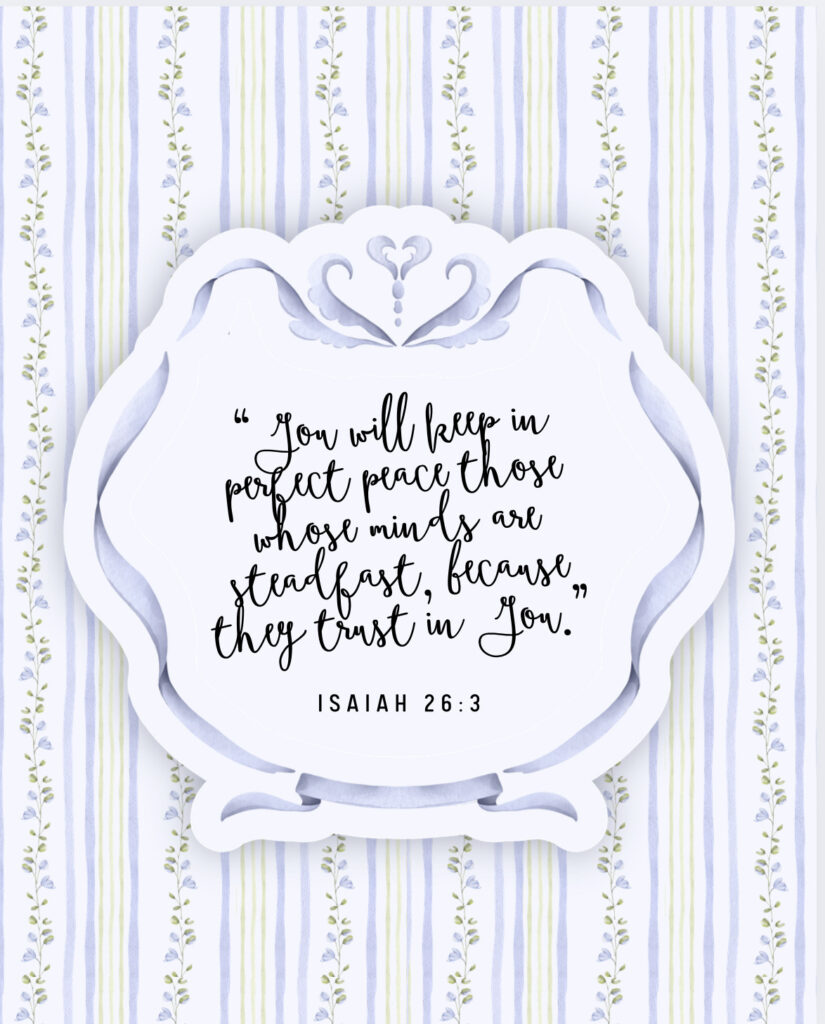Have you ever felt like the anxiety or food thoughts in your brain are so loud that you can’t focus on anything else? You’re not in full-on panic mode, but forget trying to hold a conversation—your mind is stuck on that awful disease you just read about online or the sugar in the pantry calling your name. Maybe you’ve finally had a “good day” with food and don’t want to “ruin it.”
Yeah, I’ve been there. And let me tell you—that is no way to live.
When I began reading the Bible consistently, I realized that God’s Word holds everything we need to quiet the chaos. Scripture, prayer, worship music, and sound biblical podcasts have reshaped my thinking. They’ve turned down the anxiety volume—and by God’s grace, the food noise is almost completely gone.
What I Do When Anxiety Spirals (Especially With OCD and Food Thoughts)
As someone who lives with OCD, I’ve experienced intense intrusive thoughts that loop on repeat. I get fixated. I obsess. It can take over my mind and my day. But here’s how I’ve learned to respond—practically and spiritually:
1. Acknowledge the Mental Battle (and the Spiritual One)
Sometimes it’s brain chemistry; sometimes it’s spiritual warfare. I’ve learned to first acknowledge that this is a real struggle, not a character flaw. When I sense spiritual attack, I rebuke Satan in the name of Jesus and ask God to remove the thoughts. I speak truth over myself, out loud if I have to.
2. Immerse Myself in Scripture
I go straight to God’s Word and let it fill my mind. I read slowly, even out loud. Sometimes I pray the words of Scripture directly back to God. It reminds me of who He is and grounds me in truth.
“You will keep in perfect peace those whose minds are steadfast, because they trust in You.” – Isaiah 26:3

3. Prayer Walks
This has been a game-changer. I take 20–30 minutes to walk and intentionally pray. For the first half, I try to quiet my mind and listen for God. The second half, I talk to Him—either silently or out loud. Sometimes I listen to a trusted Christian podcast or worship music. By the end, I almost always feel lighter and more focused.
4. Talk to Someone You Trust
Whether it’s my therapist, nutritionist, husband, or a trusted friend, I make it a point to talk. Isolation is one of the enemy’s greatest tools. God created us for community. If you’re struggling, please reach out to a Christian therapist or someone who deeply walks with the Lord.
5. Prayer Journaling
This is a non-negotiable in my daily routine. I write out my prayers—everything from a brain dump to gratitude lists to intercessory prayer. If anxiety is intense, I’ll journal multiple times a day. It helps to get it all out and surrender it to God on paper.
6. Build Healthy, God-Honoring Habits
One of the best things I’ve done for my mind and soul is to avoid habitual sin and instead invest in life-giving rhythms:
- Daily movement (a workout or walk)
- Staying hydrated
- Nourishing my body with whole foods
- Worshiping through music or Scripture reading
These small habits make a big difference when done consistently.
7. Know What Draws You Closer to God—And Do It Often
For me, it’s reading the Bible, walking outside, or drinking coffee with worship music in the background. These things reconnect me with God’s presence. They are now non-negotiables in my routine because they nurture my relationship with Jesus.
8. Know That God’s Love Is Enough
This is a powerful mindset shift, especially on hard body image days. When you have a deep relationship with God, you begin to realize that His opinion is the only one that truly matters—and He loves you unconditionally. That truth changes everything.
When I’m struggling, I remind myself:
“Jesus loves me, this I know, for the Bible tells me so.”
It sounds simple, but that childlike faith brings me peace. His love is enough—no number, no body shape, no approval from others can replace that truth.

9. Let the Holy Spirit Guide You
In the early stages of my walk with Christ, I still clung to a lot of sin—especially around food. But once I was filled with the Holy Spirit, I began feeling gentle (and sometimes strong) convictions.
On prayer walks, during journaling, while reading the Bible, or just sitting still and listening, I’d sense God revealing areas of sin and calling me to let them go. It wasn’t always easy—removing those behaviors felt uncomfortable at first. But with every surrender came greater peace.
Conviction from the Holy Spirit isn’t condemnation—it’s an invitation to freedom.
And with each step of obedience, my anxiety and obsessive thoughts lost more and more of their power.
10. Remember the Gospel: Jesus Sets You Free
At the heart of it all is this truth:
Jesus died for your sins, was buried, and rose again—so you don’t have to carry the burden of shame or guilt.
When you believe in Him, repent, and confess your sins, He forgives you fully. And as your heart changes, so do your behaviors. You begin walking in step with the Spirit, and over time, that naturally leads to a deeper relationship with God and a decrease in anxiety.
This isn’t behavior modification—it’s transformation through grace.

Final Thoughts: You Can Find Freedom from Anxiety and Food Noise
I do these things regularly—most of them every single day. And while I still have hard moments, I can say this confidently:
God is in control, not my anxiety. Not my thoughts. Not food.
I can’t fix everything. But I can choose to keep turning to Him, growing in faith, and trusting that His peace surpasses all understanding (Philippians 4:7).
My prayer for you is that these practical, biblical tools bring you real relief. That as you lean on God, the volume of anxiety fades—and you find freedom in Christ, not just from food noise, but from fear itself.

Leave a Reply